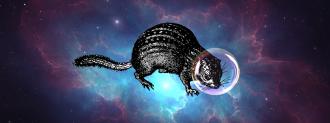When they enter hibernation, ground squirrels fast and their metabolic processes slow, surviving off the fat they’ve stored. But despite how long they’ve been inactive, by spring, the squirrels somehow haven’t lost much muscle mass or function.
It’s been a mystery since the 1980s, when a leading theory emerged: hibernating animals could use microbes in their gut to pull nutrients out of urea (yes, the stuff in your pee).
Now, University of Montreal researcher Matthew Regan and colleagues have found evidence that the theory is correct, and caused by a symbiotic relationship between ground squirrels and their gut microbes.
During hibernation, ground squirrels don’t lose much muscle mass — but we weren’t sure how.
The microbes break down urea into nitrogen, which the squirrels (and microbes) use to build muscle proteins during hibernation.
If this process could be adapted in some way to work in people, it could allow astronauts to maintain muscle mass during space flight — one of the key challenges to taking longer trips.
Staying strong: The study, published in Science, confirmed a theory called “urea nitrogen salvage.”
Extracting the nitrogen from the urea in their bodies allows the ground squirrels to continue building muscle so they can emerge from hibernation ready for their, ahem, busy season.
The nitrogen salvage then may “contribute to their reproductive success during the mating season,” Regan said.
Ground squirrel symbiosis: Regan’s study looked at the 13-lined ground squirrel, a species common to North America.
To figure out if the squirrels were getting nitrogen from urea, they injected them with urea that had unique carbon and nitrogen atoms. These atoms served as a tracker, telling the team if nitrogen they found in the ground squirrels’ muscles came from the urea.
They were able to trace the urea from the ground squirrels’ blood to its gut, where it was broken down into nitrogen. They then traced that nitrogen to the squirrels’ tissues.
By performing the experiment in the summer and at the beginning and end of hibernation season, the researchers were able to determine that the squirrels’ did most of their nitrogen salvaging in late winter, GEN reports.
The researchers confirmed that microbes in the ground squirrels’ cuts pulled muscle-building nutrients from urea during hibernation.
When the team tried the experiment in squirrels who had their gut microbiomes intentionally depleted, the urea wasn’t broken down into nitrogen — the squirrels needed the microbes to get it done.
They also found evidence that the microbes were using the nitrogen to build proteins during their hibernation, as well, making the whole arrangement a truly symbiotic one.
From hibernation to space station: Because they’re no longer constantly working against gravity, astronauts rapidly lose muscle mass in space.
Currently, astronauts have to work out like crazy to try to make up for this. But that poses a problem: how can they maintain muscle and bone on very long trips, for extended stays, or traveling in a tiny spacecraft?
It’s far too early to say for certain, but if we could get astronaut’s bodies to recycle and rebuild with nitrogen like ground squirrels do during hibernation, they may be able to keep building muscle, helping to offset what they lose.
“Because we know which muscle proteins are suppressed during spaceflight, we can compare these proteins with those that are enhanced by urea nitrogen salvage during hibernation,” said Regan, who is continuing his research with the Canadian Space Agency.
If we could adapt nitrogen salvaging for humans, it may allow us to survive longer stints in space.
Closer to Earth, nitrogen salvaging may be able to help people suffering from malnutrition or the elderly to keep their body mass up. A previous study suggests that humans actually can do urea nitrogen salvage, too, Regan said — perhaps that ability can be optimized.
As a possible solution, he suggests a certain kind of probiotic pill that you could take before or after eating that would increase the right kind of microbes in your gut. But anything like that would be years in the future.
“To be clear, these applications, though theoretically possible, are a long way from delivery, and a lot of additional work is needed to translate this naturally evolved mechanism safely and effectively to humans,” Regan said.
We’d love to hear from you! If you have a comment about this article or if you have a tip for a future Freethink story, please email us at [email protected].






